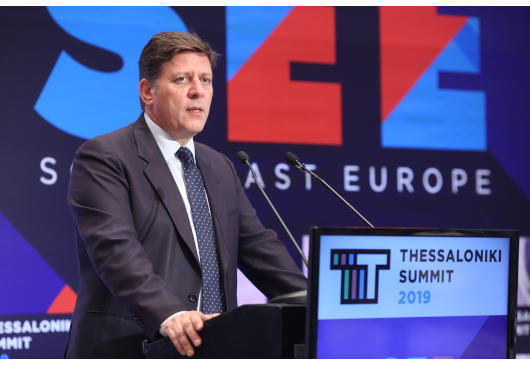 Addressing the 4th Thessaloniki Summit, Alternate Minister of Foreign Affairs Miltiadis Varvitsiotis sent a two-fold message – that Greece is coming to the forefront again and regaining its strategic role in the Balkans, on a political and economic level, and that the future of the Balkans lies in Europe – announcing that the government is planning a 2020 Summit Meeting in Thessaloniki for all of the Balkan countries. Mr. Varvitsiotis subsequently participated in Prime Minister Kyriakos Mitsotakis’ bilateral meetings with the Prime Minister of North Macedonia, Zoran Zaev, and the Prime Minister of Bulgaria, Boyko Borissov.
Addressing the 4th Thessaloniki Summit, Alternate Minister of Foreign Affairs Miltiadis Varvitsiotis sent a two-fold message – that Greece is coming to the forefront again and regaining its strategic role in the Balkans, on a political and economic level, and that the future of the Balkans lies in Europe – announcing that the government is planning a 2020 Summit Meeting in Thessaloniki for all of the Balkan countries. Mr. Varvitsiotis subsequently participated in Prime Minister Kyriakos Mitsotakis’ bilateral meetings with the Prime Minister of North Macedonia, Zoran Zaev, and the Prime Minister of Bulgaria, Boyko Borissov.
Setting out Greece’s positions on the future prospects of Southeastern Europe, on a panel that also included the Vice President of North Macedonia, Kocho Angiushev, and Turkish Deputy Foreign Minister Farul Kaymakci, Mr. Varvitsiotis stressed that Greece is leaving the crisis era behind and laying the foundations for a comeback in the region as a trade partner and investor, strengthening its openness and capitalising on the opportunities in the field of connectivity – especially infrastructure, energy and the digital economy.
He also noted that Greece has a duty to play a leading role in the European integration process for the countries of the region.
The Alternate Minister stressed that, for our country, there is no “enlargement or deepening” dilemma – there is only more Europe.
In this context, he announced tangible initiatives that the Greek government is taking to support the European perspective of the Western Balkan countries, and specifically the convening of a quadrilateral Greece-Bulgaria-North Macedonia-Albania meeting in Thessaloniki soon, and the hosting, early next year, of a Summit of EU countries in the wider region of the Balkans with the five countries of the Western Balkans and Kosovo, sending a message that “the future of the Balkans lies in Europe.”
Regarding the accession negotiations of North Macedonia and Albania, he reiterated Greece’s support, in the framework of conditionality – in other words, under the condition that the two countries meet specific requirements. He described the progress in the implementation of the Prespa Agreement as unsatisfactory – particularly with regard to the so called “antiquization” programme, the revision of school books and certain administrative issues, which the neighbouring country must deal with as priorities, and he stressed the need for Albania to respect the rights of the Greek National Minority, including property rights.
Mr. Varvitsiotis also highlighted Greece’s role as a factor for strengthening Turkey’s European course. Provided Turkey respects international law, ceases its violations and stops functioning as a destabilising factor in Southeastern Europe, the two countries will be able to bolster their positive agenda, and Turkey will be able to return to its European path, he stressed. In the same spirit, he stressed the necessity of a joint effort to implement the EU-Turkey Joint Statement in dealing with the migration problem, and he called on Turkey to meet its obligations in the joint crackdown on trafficking organizations.
Mr. Varvitsiotis concluded his speech with a reference to the major issue of climate change, regarding which, as he said, Greece has ambitious goals.
Central to Mr. Varvitsiotis’ address was Thessaloniki itself and the city's leading role, which the Alternate Minister has often highlighted. Specifically, he stressed that the port of Thessaloniki can emerge as a central commercial hub, that the Thessaloniki-Izmir ferry link must be launched, and that the hosting of inter-state summits in the city points up its crucial role in regional developments.
November 14, 2019


